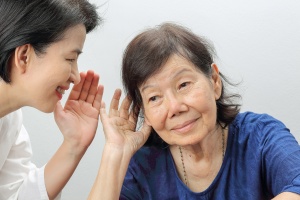Dowload a PDF copy: Beyond Hearing Aids: Resident-Centered Hearing Care as One Remedy for Loneliness
Human connection is integral to good health, but for many residents within skilled nursing facilities, unaddressed hearing loss seriously undermines those essential ties, creating a painful sense of isolation. As the struggle to follow conversations and communicate takes its toll, individuals often forgo activities, and loneliness escalates.
Treating hearing loss in a more comprehensive approach through onsite patient-centered ancillary hearing care can keep residents socially connected and boost overall wellness, while offering expert support and convenience for internal staff.
The urgency and challenges of addressing hearing loss
In May 2023, U.S. Surgeon General Dr. Vivek Murthy deemed loneliness a public health crisis.1 He cited compelling data: Insufficient social connection increases the risk of heart disease by 29%, stroke by 32%, premature death by more than 60%, and dementia in older adults by 50%. These statistics make a strong case for skilled nursing facilities to pay close attention to sensory impairments that can increase isolation.
However, the complex interplay of physical, psychological, and social factors inherent to hearing loss can create barriers to optimal audiology care. For example, 40% of adults who recognize a decrease in their ability to hear don’t inform their clinicians.2 Only one in five of those who could benefit from hearing aids use one.3 A recent Forbes Health survey suggests that many individuals are skeptical of hearing aids and feel that hearing specialists are more focused on selling them than on managing hearing loss. These perceptions can pose significant impediments to productive patient-provider interactions.4
Audiology care tuned into the unique needs of skilled nursing facility residents
Hearing care directed at preserving ear health and solving individual communication problems can enrich a resident’s quality of life. This requires keen awareness to the patient’s perspective gained through active, empathetic listening. Unfortunately, consultations often can be dominated by the audiologist delivering information rather than the patient speaking.5 This translates into missed opportunities for establishing trust, shared decision-making, and patient-centered communication.
Aria Care Partners’ extensive experience in delivering onsite preventive and restorative ancillary care services to skilled nursing communities across the country has shown that effective hearing care relies on two fundamental elements, as explained below.
- Therapeutic approach: Spotting hearing problems, both established and incipient, is the bedrock of audiology care. It helps avoid more serious complications that can be tied to coexisting conditions or other risk factors, and it’s a prerequisite to alleviating associated afflictions. Comprehensive hearing care includes more than basic tests and hearing aids. Assistive technologies such as pocket talkers, TV headsets, and closed captions can have far-reaching therapeutic value, especially when used to meet residents where they are in their hearing journey. Clearly explaining all care options is essential.
- Patient-centered communication: Making residents comfortable in a hearing loss-friendly setting within the skilled nursing facility is a critical first step. It eases the conversation for fully understanding their hearing difficulties, communication challenges, and in identifying those hearing situations most important to them. Vital to this care model is bedside manner: being respectful and responsive to the resident’s needs, preferences, values, and goals, and addressing their concerns with sensitivity, including when memory issues coexist. These bridge-building exchanges enable hearing care professionals and residents to make informed decisions about next steps together. Patient-centered care doesn’t end with the appointment, however. A tailored hearing plan may include communication strategies for the patient, family, and staff so everyone is engaged in ensuring the individual’s optimal well-being.
Keeping residents with hearing loss socially connected is about much more than hearing aids and the amplification of sound. Compassionate, comprehensive, and convenient onsite ancillary audiology care fosters meaningful relationships. It’s also a significant value-add for skilled nursing facilities striving to optimize their resident experience.
 Home Page
Home Page Home Page
Home Page

 Share to Twitter
Share to Twitter
 Share to Linked In
Share to Linked In




